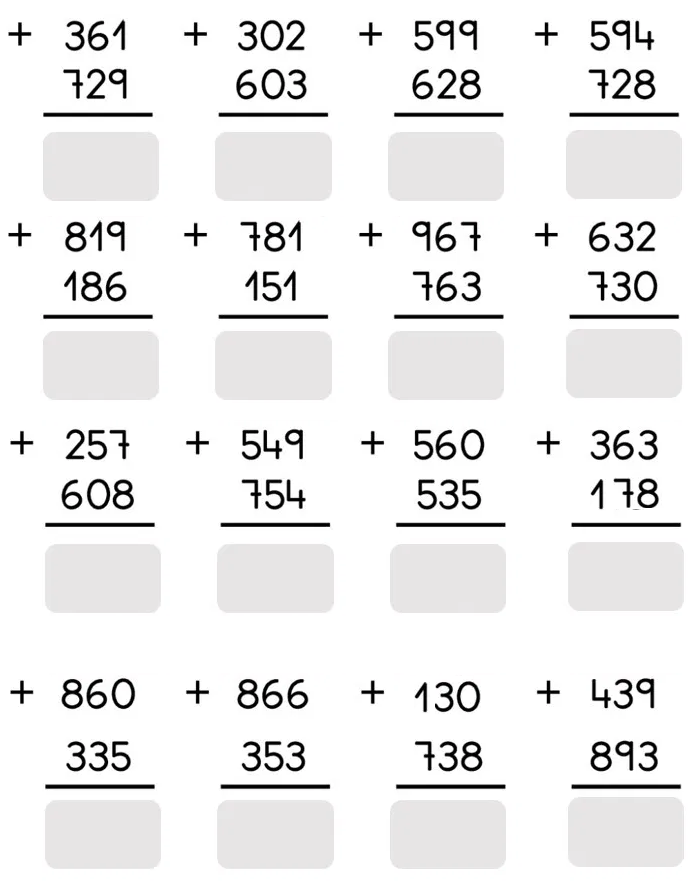Mastering 3-Digit Addition with Carrying
Imagine effortlessly adding numbers like 456 and 789. This seemingly simple task relies on a fundamental concept: 3-digit addition with carrying. This core arithmetic skill unlocks a world of mathematical understanding and is crucial for everyday calculations.
Three-digit addition involving carrying, also known as regrouping, forms the bedrock for more advanced mathematical operations. It's the process of adding numbers where the sum of a column's digits exceeds nine, requiring us to "carry" the tens value to the next higher place value. Mastering this skill is essential for building confidence in math.
While the precise origins of addition with carrying are intertwined with the history of arithmetic itself, the importance of this method remains undeniable. From basic budgeting to complex scientific calculations, the principle of carrying over excess values is a cornerstone of accurate computation. This method ensures that every digit contributes its correct value to the final sum, regardless of its position within the number.
One of the primary challenges learners face with 3-digit addition involving regrouping is understanding the concept of place value. Recognizing that the '5' in 152 represents 5 tens, or 50, is crucial for grasping why we carry the '1' to the hundreds place when the sum of the tens column exceeds 9. Another common issue is simply keeping track of the carried-over digits, especially when dealing with multiple additions.
Let’s illustrate with an example: adding 257 and 365. Starting with the units column, 7 + 5 equals 12. We write down '2' in the units place of the answer and carry-over '1' to the tens column. Now, in the tens column, we have 1 (carried over) + 5 + 6, totaling 12. Again, we write down '2' in the tens place and carry-over '1' to the hundreds place. Finally, in the hundreds column, we have 1 (carried over) + 2 + 3, which equals 6. Thus, the final answer is 622.
A step-by-step guide for 3-digit addition with carrying is as follows: 1) Align the numbers vertically, ensuring each place value is correctly positioned. 2) Add the digits in the units column. If the sum is greater than 9, carry the tens value to the next column. 3) Repeat this process for the tens and hundreds columns. 4) Write down the final sum.
Frequent practice with different 3-digit numbers strengthens understanding and builds fluency. Online math games and worksheets provide engaging practice opportunities.
One benefit of mastering this skill is improved mental math abilities. Another is increased confidence in handling larger numbers and more complex calculations. Finally, it lays a strong foundation for further mathematical learning, including multiplication, division, and decimals.
Tips for success: Use visual aids like counters or blocks to represent the numbers and the carrying process. Practice regularly with a mix of easy and challenging problems. Review and correct mistakes to reinforce learning.
Advantages and Disadvantages of Column Addition (which encompasses 3-digit addition with carrying)
| Advantages | Disadvantages |
|---|---|
| Clear and structured approach | Can be tedious for very large numbers |
| Easy to learn and apply | Requires careful attention to place value and carrying |
| Fundamental for various mathematical operations | May not be intuitive for some learners initially |
Five real-world examples: calculating the total cost of groceries, determining the combined distance of a road trip, adding up scores in a game, managing a budget, and measuring the total area of land.
Five challenges and solutions: Forgetting to carry: Use visual reminders or a checklist. Place value confusion: Use place value charts. Difficulty with larger numbers: Break down the problem into smaller parts. Slow speed: Practice regularly. Lack of confidence: Celebrate small successes and focus on progress.
FAQs: 1. Why is carrying important? It ensures correct place value representation. 2. What happens if I forget to carry? The answer will be incorrect. 3. How can I improve my speed? Practice regularly. 4. What tools can I use? Place value charts, counters, online games. 5. Can I use a calculator? Calculators can check answers but manual practice is crucial for skill development. 6. Is there an easier way to add large numbers? Breaking them down can help. 7. How do I know I'm ready for more advanced math? When you consistently perform 3-digit addition with carrying accurately and efficiently. 8. Where can I find more practice problems? Textbooks, workbooks, and online resources offer numerous practice problems.
In conclusion, mastering 3-digit addition with carrying, or regrouping, is an essential building block in mathematics. It empowers us to perform everyday calculations, understand fundamental arithmetic principles, and build a solid foundation for tackling more complex math concepts. This skill enables confident handling of larger numbers and unlocks opportunities for advanced learning in mathematics and related fields. While it presents some initial challenges, consistent practice, visual aids, and a clear understanding of place value can lead to mastery. Embrace the journey of learning this vital skill and witness the doors it opens in your mathematical journey.
Understanding the impact of michael c benders nyt reporting
Current time in santiago chile
Nourishing expectant mothers the importance of prenatal nutrition














